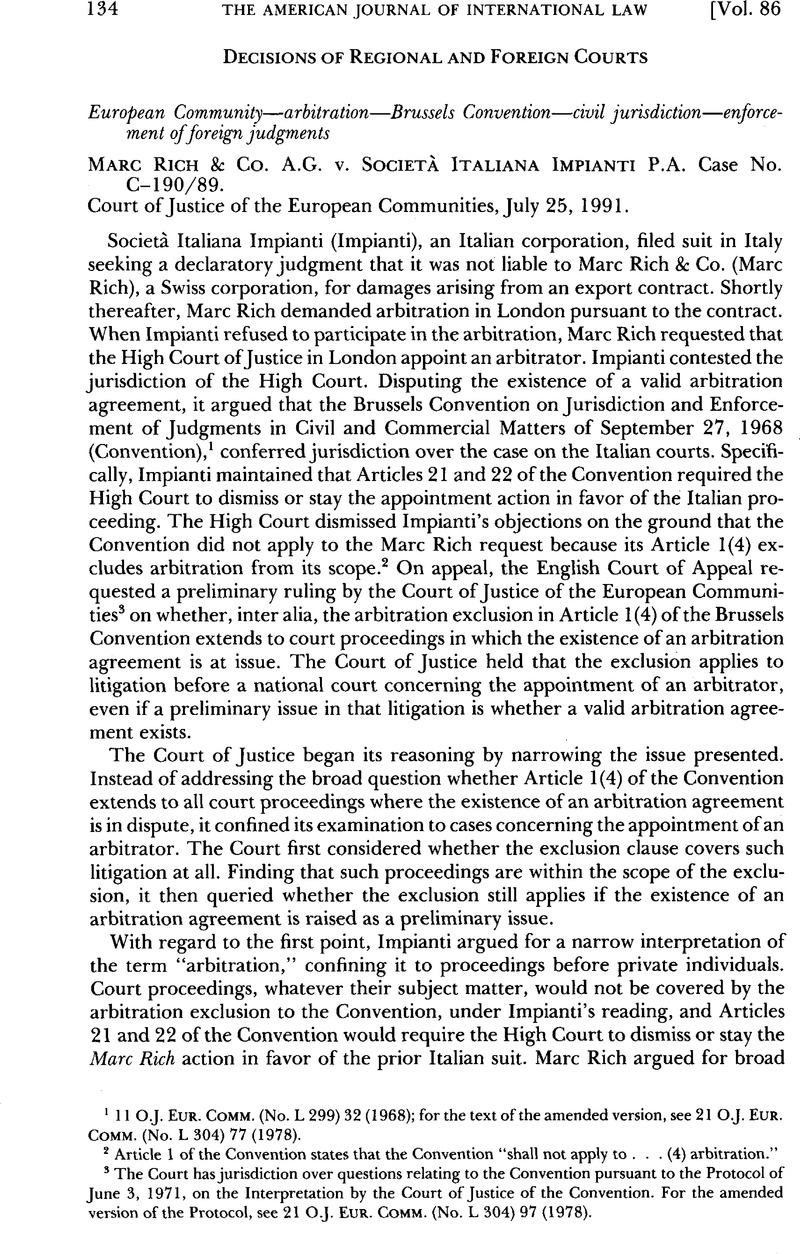No CrossRef data available.
Article contents
Marc Rich & Co. A.G. v. Società Italiana Impianti P.A.
Published online by Cambridge University Press: 27 February 2017
Abstract

- Type
- International Decisions
- Information
- Copyright
- Copyright © American Society of International Law 1992
References
1 11 O.J. Eur. Comm. (NO. L 299) 32 (1968); for the text of the amended version, see 21 O.J. Eur. Comm. (No. L 304) 77 (1978).
2 Article 1 of the Convention states that the Convention “shall not apply to … (4) arbitration.”
3 The Court has jurisdiction over questions relating to the Convention pursuant to the Protocol of June 3, 1971, on the Interpretation by the Court of Justice of the Convention. For the amended version of the Protocol, see 21 O.J. Eur. Comm. (No. L 304) 97 (1978).
4 The opinions submitted by the French, British and German Governments took the same view.
5 Article 220 of the Treaty reads in relevant part: “Member States shall, so far as is necessary, enter into negotiations with each other with a view to securing for the benefit of their nationals: … the simplification of formalities governing the reciprocal enforcement of judgments of courts or tribunals and of arbitration awards.” Treaty Establishing the European Economic Community, Mar. 25, 1957, 1973 Gr. Brit. TS No. 1, pt. II (Cmd. 5179 II), 298 UNTS 11.
6 The official report on the Convention prepared for the governments in connection with the drafting of the Convention. 22 OJ. Eur. Comm. (No. C 59) 1, 13 (1979).
7 June 10, 1958, 21 UST 2517, TIAS No. 6997, 330 UNTS 3.
8 The official report on the Convention on the accession of the United Kingdom, Denmark and Ireland. 22 O.J. Eur. Comm. (NO. C 59) 71, 93, para. 64 (1979). The Court also referred to the Evrigenis and Kerameus Report on the accession of Greece to the Convention. 29 O.J. Eur. Comm. (No. C 298) 1, 10, para. 35 (1986).
9 1982 ECR 825 (jurisdiction based on contract in accordance with Article 5(1) of the Convention applies even if the existence of the contract is in dispute).
10 Id. at 834, para. 6.
11 See notes 6 and 8 supra.
12 The lone dissenting voice was apparently the “revised” opinion that Mr. Schlosser (the author of the Schlosser Report, supra note 8) had prepared at Impianti’s request. As the Advocate General noted, Mr. Schlosser’s new opinion “puts forward a view which in every respect contradicts the official report signed by him.” Opinion of Mr. Advocate General Darmon in Case C–190/89, para. 22 [hereinafter Darmon Opinion].
13 English law generally withholds recognition of foreign judgments if the proceedings were brought contrary to an arbitration agreement. See Section 32 of the Civil Jurisdiction and Judgments Act 1982, ch. 27. If applicable, the Convention would require such recognition.
14 The Court’s reliance on EfFer v. Kanter, 1982 ECR 825, for this point is not entirely convincing. In Effer, the Court had pointed out that the Convention sought to create legal certainty by avoiding concurrent litigation in different countries. Id. at 834, para. 6. The nonapplication of the Convention in the present case obviously fails to serve that goal.
15 Impianti, too, relied on Effer v. Kanter for this proposition.
16 Darmon Opinion, supra note 12, paras. 72–73.
17 Id., paras. 76–77.
18 The Commission had argued that the exclusion in the Convention did not extend to court proceedings in which the existence or validity of an arbitration agreement was raised as a preliminary issue.
19 Darmon Opinion, supra note 12, para. 104.
20 The principle that an arbitrator may himself appraise his jurisdiction.
21 The (disputed) concept of a “denationalized” body of legal rules governing transnational commercial disputes.
22 Darmon Opinion, supra note 12, paras. 11–15, 101, 104.


